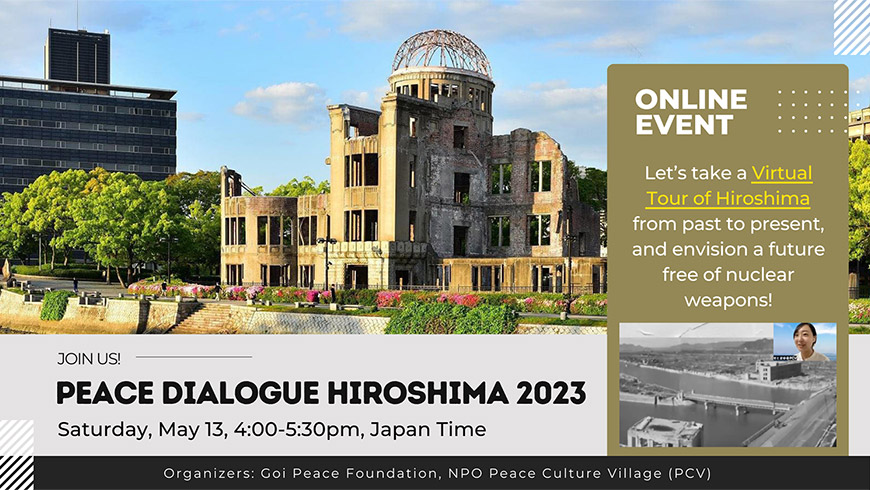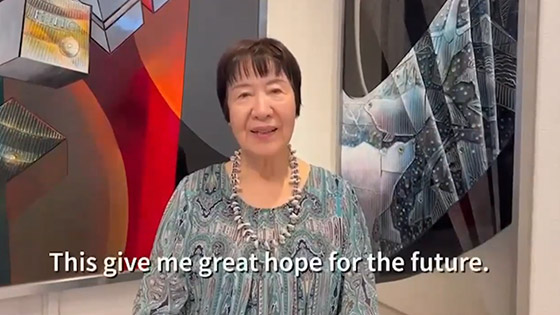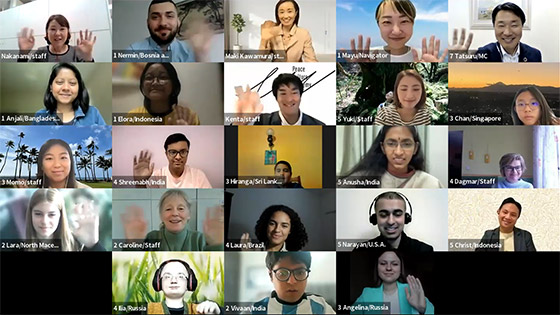
Summary
On Saturday, May 13, in conjunction with the G7 Hiroshima Summit, the Goi Peace Foundation, which develops educational programs to foster leaders of peace, and Peace Culture Village (PCV), a non-profit organization that promotes youth-led peace education in Hiroshima, hosted the online event “Peace Dialogue Hiroshima 2023.”
330 young people from 41 different countries took part in the event. They ranged in age from teens to 30s, with diverse values and cultural backgrounds. Through a virtual tour of Hiroshima Peace Memorial Park and facilitated dialogue, they reflected on what they can do to create a culture of peace, not only for their own country and its leaders but for all people.
Report
In his opening message, Hiroo Saionji, President of the Goi Peace Foundation, said, “I hope that through open dialogue among young people, we can share ideas to prevent the repetition of tragedies and deepen mutual understanding for a peaceful, nuclear-weapon-free world.” Steven Leeper, former President of the Hiroshima Peace Culture Foundation and founder of the PCV, remarked, “Hiroshima is a fitting base for dispatching a ‘culture of peace’ to counter the culture of war, and I hope this event will be a catalyst for building peace.”
The Hiroshima Peace Memorial Park Virtual Tour, navigated by PCV staff, took visitors on an online tour of the area around the hypocenter, which was recreated using digital technology, to learn about the town and people’s daily lives before the atomic bombing, as well as the reality of the bombing and the history of reconstruction after the bombing.

The virtual tour concluded with a message from Ms. Toshiko Tanaka, a Hiroshima resident and A-bomb survivor: “I believe that the path to peace begins with our small steps. Please make friends around the world. When problems arise between nations, you don’t want to drop bombs on the heads of your best friends. Make this issue your own and take the first step forward.
The young people discussed their impressions and insights after the tour, and talked about what they can do for peace.
Voices of young people

The young people who participated in this event learned and realized many things, and also reaffirmed their belief that it is each person’s strong desire and actions for peace that will foster a culture of peace.
The Goi Peace Foundation will continue to disseminate the voices of young people around the world who are sincerely committed to creating a culture of peace, and will continue to develop various educational programs to nurture leaders of peace.
*Youth participants (41 countries)
Afghanistan, Algeria, Bangladesh, Bosnia and Herzegovina, Brazil, Canada, Chile, Ecuador, Egypt, Fiji, India, Indonesia, Iran, Iraq, Japan, Kazakhstan, Kenya, Kuwait, Lesotho, Malaysia, Mexico, Myanmar, Netherlands, Nigeria, North Macedonia, Pakistan, Philippines, Poland, Romania, Russia, Singapore, Slovakia, South Africa, Sri Lanka, Syria, Turkmenistan, Uganda, Ukraine, USA, Uzbekistan,
Zambia
Inquiries
Goi Peace Foundation
Heiwa Daiichi Building, 1-4-5 Hirakawacho, Chiyoda-ku, Tokyo 102-0093, Japan
TEL 03-3265-2071
513peace@goipeace.or.jp
Peace Culture Village (PCV) NPO
26, Fukuda, Konu-cho, Miyoshi, Hiroshima 729-4111, Japan
peaceculturevillage.org
